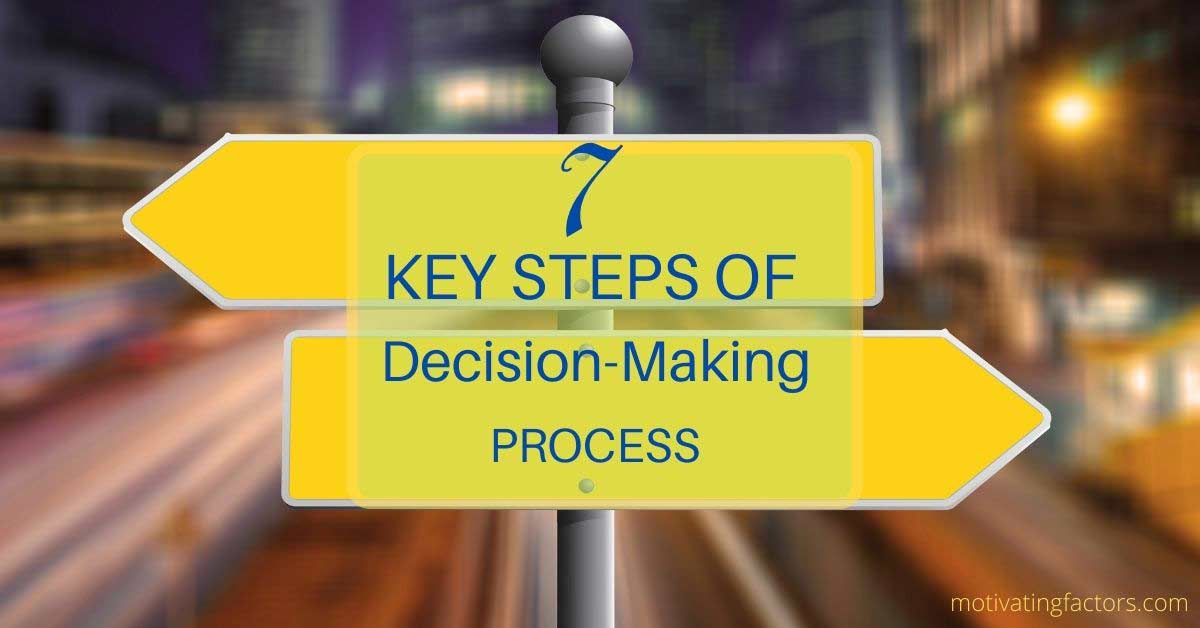Whether it is in your professional life or personal, you’re making decisions every second of your life. Decision-making process is one of the most basic and essential functions we perform in our daily life. Matter of fact, this is the primary function of every living being on Earth since we make a decision first before doing literally anything.
Wikipedia defines decision-making as a “cognitive process resulting in the selection of a belief or a course of action among several possible alternative options, it could be either rational or irrational.” The Decision-making process is a thought process based on assumptions of values, preferences, and beliefs of the decision-maker.
While carrying out an effective decision-making process, it’s important to keep factors like the nature of the decision, time taken, and the outcome of the decision into consideration. Making a decision, which is rational, timely, and based on careful analysis is very crucial for the success of your goal? Therefore, you need to make decisions by following a well-thought-out process.
Here are the 7 key steps to help you make your decision-making process successful:
1. Identify the decision
The first and foremost step of a decision-making process is to identify your decision. That means recognizing your goal or objective. What’s the purpose of your decision? Maybe it’s to find a solution to a problem or finding an answer to a question. Whatever it is that you’re trying to achieve by making that decision, it’s necessary to be familiar with your decision.
2. Collect relevant data
After you’ve identified your decision, it’s time to collect the information and resources that are required and relevant to your decision. For this, you have to do thorough research on the elements that can be a critical factor for your decision-making. You have to know what information you need, what’s the best place to find it, and how to find it.
3. Find alternatives
As you’re looking for the relevant information from different sources, you’ll come across different possible solutions, which you can study and utilize to pursue your goal. It’s important to have a wide range of options to select from while making a decision because it helps you to determine which plan is the best way to achieve your goal.
4. Evaluate the alternatives
In this step, you’ll have to find which of the resources you searched for is ideal for your goal. Once you have numerous alternatives available in your hand, evaluate those alternatives, compare their pros and cons. You have to evaluate them for probability, suitability, and desirability. Consequently, this allows you to know which option is the best.
5. Select the best alternative
This is a part of the decision-making process, where you start to make a decision. After evaluating every accessible alternative completely, you are all set to select the alternative that’s the ideal one for your objective. Before deciding on choosing the best alternative, you need to be sure and confident about the risks involved with the option you go with.
6. Take action
This is the most crucial step in the decision-making process. After you’ve chosen the best alternative for your goal, you have to start acting on it. Meaning; you have to create a plan or layout for the execution of these resources. This involves the identification of the required resources and support from your employers and shareholders.
7. Review your decision
This is the step that the majority of people ignores or fails to notice, which is the reason why they fail in proper decision-making. In this last step, you have to look at the results of your decision and analyze whether you were successful in solving the problems, and find the answers which you were searching for in the first stage. If you were unable to meet these requirements, learn from your previous mistakes, and repeat certain steps of the process to make a new decision.
Also Read: 7 Morning Routines of The Extremely Successful People
Frequently Asked Questions (FAQs)
What are the 7 steps in the decision-making process?
Here are the 7 steps of the decision-making process:
- Identify the decision
- Collect relevant data
- Find alternatives
- Evaluate the alternatives
- Select the best alternative
- Take action
- Review your decision
What are the 3 types of decision making?
The 3 major decision making types:
- Personal decision-making
- Business decision-making
- Consumer decision-making
What is effective decision making?
Effective decision making is defined here as the process through which alternatives are selected and then managed through implementation to achieve business objectives. Effective decisions result from a systematic process, with clearly defined elements, that is handled in a distinct sequence of steps
What is the importance of decision making?
Decision making is important to achieve the organizational goals/objectives within a given time and budget. It searches for the best alternative, utilizes the resources properly, and satisfies the employees at the workplace. As a result, organizational goals or objectives can be achieved as per the desired result.
What are the characteristics of decision making?
Here are the characteristics of decision-making:
- Based on rational thinking
- Process of selecting the best alternative
- Aimed to achieve organizational goals.
- Measurement of performance
- Pervasive function
- Continuous and dynamic process

[…] Also Read: Top 7 Key Steps of the Decision-Making Process That You Must Follow […]
[…] Also Read: Top 7 Key Steps of the Decision-Making Process That You Must Follow […]
[…] Top 7 Key Steps of the Decision-Making Process That You Must Follow […]
[…] Also Read: Top 7 Key Steps of the Decision-Making Process That You Must Follow […]
[…] you who gets to make decisions about your life, it’s your opinion that matters, and it’s you who’s responsible for making or […]